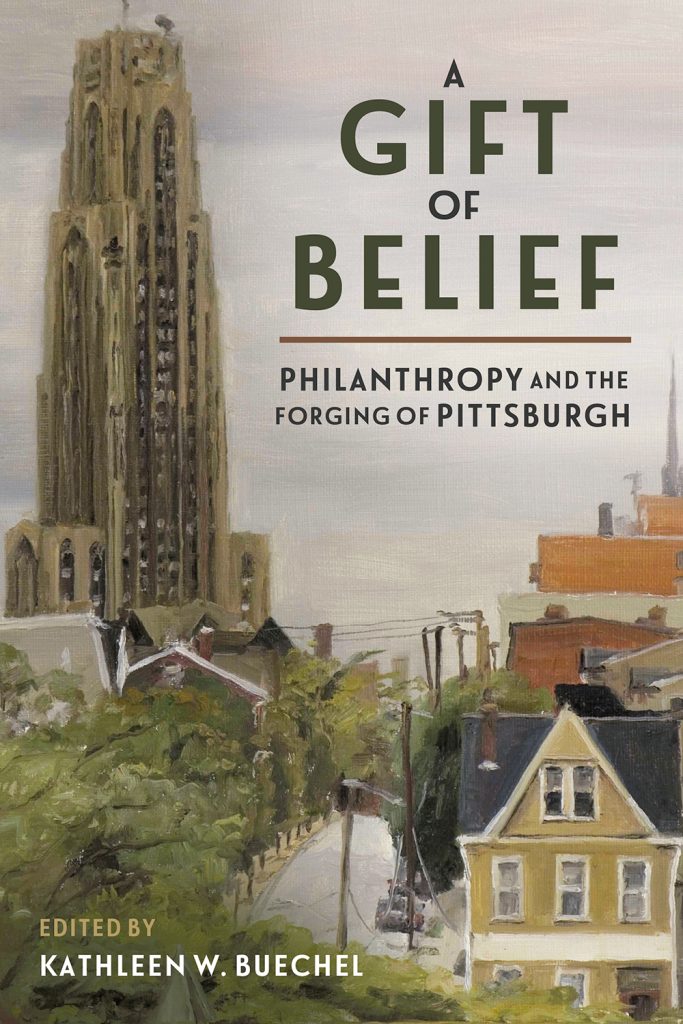 A Gift of Belief: Philanthropy and the Forging of Pittsburgh
A Gift of Belief: Philanthropy and the Forging of Pittsburgh
Edited by Kathleen W. Buechel
University of Pittsburgh Press, 2021
384 pages
Hardcover, $40
Reviewed by Betty Arenth, former senior vice president of the Heinz History Center
Few scholars’ lives achieve the nexus of theory and practice as perfectly as Kathy Beuchel who served as the president of the Alcoa Foundation, currently leads the Benter Foundation in Pittsburgh, and is a senior lecturer at the University of Pittsburgh while directing the Philanthropy Forum at GSPIA and the Pittsburgh Philanthropy Project. Ms. Beuchel’s vast experience and broad talents combine as she crafts a distinguished team of authors and guides the reader on a fascinating, well-organized journey of discovery.
In A Gift of Belief, Ms. Buechel offers fresh insights into Pittsburgh history through the lens of philanthropic trends, organizations, and changing practices. Importantly, this publication provides tantalizing explorations of the often-unheralded works of women, religious groups, and African Americans in early American philanthropy. The editor focuses on the transformation of organized philanthropy starting around 1889, yet she clearly yearns for continued and deeper examinations of these overlooked groups as well as the myriad stories of Pittsburgh’s neighbor-helping-neighbor.
The book is generally organized into four historic periods as Ms. Buechel blends the contributions of 12 talented authors who immerse the reader into the “breadth, diversity, and development in organized philanthropy.” Clearly their goal is to provide the reader with a view of what “made these donors tick” while exploring their beliefs in promoting the public good.
Captivating snapshots of the evolution of philanthropy as grown on Pittsburgh soil range from the expected look at the traditional captains of industry (Carnegie, Frick, Mellon, Heinz), to a portrayal of the move from sectarian, faith-based efforts to “aid the needy,” to the birth of “coordinated, scientific charity” through federated, communitywide campaigns like the United Way. They cover little-known territory about the unique roles (yes, plural) of women and the “counternarrative” and resourcefulness of the African American community.
After a careful description of the purpose, tools, and practices of scientific philanthropy undertaken during the first half of the 20th century, the publication moves to an examination of the “post-WWII philanthropy playbook.” As the New Deal’s governmental safety net “altered the roles private philanthropy would play,” the authors’ pick up the story by weaving the remarkable tales from Pittsburgh’s Renaissance and creation of the Cultural District to the development of riverfront public accessibility amid the maturation of Pittsburgh’s major private foundations.
The book’s final section takes the reader from 1990 to the present day, a period described as one of “Entrepreneurism and Collective Action.” This section dives into the public policy goals of private foundations at the dawn of the 21st century and the emergence of significant “new voices” active in the region’s ongoing socio-economic transformation including efforts to reshape the traditional practices of Pittsburgh’s major philanthropic players.
A Gift of Belief lives up to its billing as a refreshing study in the forging of Pittsburgh through the lens of ever-changing philanthropic theory, practices, and players. Its rich stories make clear that “philanthropy begins with belief in values, intentions, and worldviews.” This compelling narrative is indeed a welcome contribution to the study of Pittsburgh’s history and a valuable aid to meeting the challenges ahead.